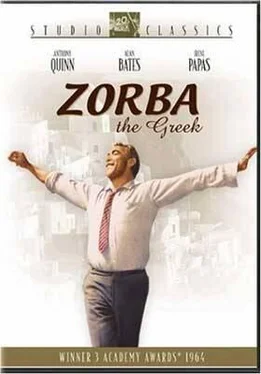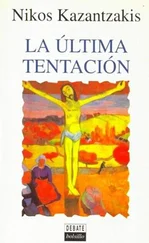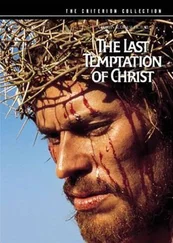Nikos Kazantzakis - Zorba The Greek
Здесь есть возможность читать онлайн «Nikos Kazantzakis - Zorba The Greek» весь текст электронной книги совершенно бесплатно (целиком полную версию без сокращений). В некоторых случаях можно слушать аудио, скачать через торрент в формате fb2 и присутствует краткое содержание. Жанр: Современная проза, на английском языке. Описание произведения, (предисловие) а так же отзывы посетителей доступны на портале библиотеки ЛибКат.
- Название:Zorba The Greek
- Автор:
- Жанр:
- Год:неизвестен
- ISBN:нет данных
- Рейтинг книги:3 / 5. Голосов: 1
-
Избранное:Добавить в избранное
- Отзывы:
-
Ваша оценка:
- 60
- 1
- 2
- 3
- 4
- 5
Zorba The Greek: краткое содержание, описание и аннотация
Предлагаем к чтению аннотацию, описание, краткое содержание или предисловие (зависит от того, что написал сам автор книги «Zorba The Greek»). Если вы не нашли необходимую информацию о книге — напишите в комментариях, мы постараемся отыскать её.
Zorba The Greek — читать онлайн бесплатно полную книгу (весь текст) целиком
Ниже представлен текст книги, разбитый по страницам. Система сохранения места последней прочитанной страницы, позволяет с удобством читать онлайн бесплатно книгу «Zorba The Greek», без необходимости каждый раз заново искать на чём Вы остановились. Поставьте закладку, и сможете в любой момент перейти на страницу, на которой закончили чтение.
Интервал:
Закладка:
"What egoism!" I said sarcastically.
"I can't help it, boss! That's how it is. I eat beans, I talk beans; I am Zorba, I talk like Zorba."
I said nothing. Zorba's words stung me like whiplashes. I admired him for being so strong, for despising men to that extent, and at the same time wanting to live and work with them. I should either have become an ascetic or else have adorned men with false feathers so that I could put up with them.
Zorba looked round at me. By the light of the stars I could see he was grinning from ear to ear.
"Have I offended you, boss?" he said, stopping abruptly. We had arrived at the hut. Zorba looked at me tenderly and uneasily.
I did not reply. I felt my mínd was in agreement with Zorba, but my heart resisted, wanted to leap out and escape from the brute, to go its own road.
"I'm not sleepy this evening, Zorba," I said. "You go to bed."
The stars were shining, the sea was sighing and licking the shells, a glow-worm lit under its belly its little erotic lantern. Night's hair was streaming with dew.
I lay face downward, plunged in silence, thinking of nothing. I was now one with night and the sea; my mind was like a glowworm that had lit its little lantern and settled on the damp, dark earth, and was waiting.
The stars were travelling round, the hours were passing-and, when I arose, I had, without knowing how, engraved on my mind the double task I had to accomplish on this shore:
Escape from Buddha, rid myself by words of all my metaphysical cares and free my mind from vain anxiety;
Make direct and firm contact with men, starting from this very moment.
I said to myself: "Perhaps it is not yet too late."
5
"UNCLE Anagnosti, the grandfather, greets you and asks if you would care to come to his house for a meal. The gelder will be coming to the village today to castrate the pigs. It's an occasion, and the 'parts' are a real delicacy. Kyria Maroulia, the gaffer's wife, will cook them specially for you. It's also their grandson Minas's birthday today, and you'll be able to wish him many happy returns."
It is a great pleasure to enter a Cretan peasant's home. Everything about you is patriarchal: the hearth, the oil lamp, the earthen-ware jars lining the wall, a few chairs, a table and, on the left as you enter, in a hole in the wall, a pitcher of fresh water. From the beams hang strings of quinces, pomegranates and aromatic plants: sage, mint, red peppers, rosemary and savory.
At the far end of the room a ladder or a few wooden steps lead up to the raised platform, where there is a trestle bed and, above it, the holy icons with their lamps. The house appears empty, but it contains everything needful, so few in reality are the true necessities of man.
It was a magnificent day, rendered very mild by the autumn sun. We sat in front of the house in the little peasant garden, under an olive tree laden with fruit. Between the silvery leaves the sea could be seen gleaming in the distance, perfectly calm and still. Vaporous clouds were continually passing in front of the sun and making the earth appear now sad, now gay, as if it were breathing.
At the end of the tiny garden, in an enclosure, the castrated pig was squealing with pain and deafening us. The smell of Kyria Maroulia's cooking on the embers in the hearth reached our nostrils.
Our conversation was confined to the everlasting topics: the corn crops, the vines, the rain. We were obliged to shout because the old gaffer was hard of hearíng. He said he had "a proud ear." This old Cretan's lífe had been straightforward and peaceful, like that of a tree ín a sheltered ravine. He had been born, had grown up and had married. He had had children and had had time to see his grandchildren. Several had died, but others were living: the continuation of the family was assured.
This old Cretan could recall the old days, Turkish rule, the sayings of his father, the miracles which happened in those days because the women-folk feared God and had faith.
"Why, look at me here, old uncle Anagnosti who's speakíng to you! My own birth was a miracle. Aye, upon my soul, a miracle! And when I tell you how it happened, you'll be amazed. 'The Lord have mercy on us,' you'll say, and go to the monastery of the Virgin Mary and burn a candle to her."
He crossed himself and, in a soft voice and gentle manner, began to tell his tale.
"In those days, then, a rich Turkish woman lived in our village-damn her soul! One fine day the wretch became big with child and the time came for her to give birth. They laid her on the trestle bed and she stayed there bellowing like a heifer for three days and nights. But the child wouldn't come. So a friend of hers-damn her soul, too!-gave her some advice. 'Tzafer Hanum, you should call Mother Mary for help!' That's how the Turks call the Virgin. Great be her power! 'What for?' that Tzafer bitch bellowed. 'Call her? I'd sooner die!' But her pains became more acute. Another day and night went by. She was still bellowing, and still she couldn't deliver the child. What could be done? She couldn't bear the pains any longer. So she started to shout for all she was worth: 'Mother Mary! Mother Mary!' But it was no use, the pains wouldn't stop and the child wouldn't come. And her fríend said: 'Perhaps she can't understand Turkish!' So that bitch yelled: 'Virgin of the Roumis! Virgin of the Roumis!' [11]Roumis be damned! The pains increased. 'You're not calling her the proper way,' said the friend. 'You're not calling her the proper way, and that's why she won't come.' So that heathen bitch, seeing her peril, cries out fit to burst her lungs: 'Holy Virgin!' And straight away the child slipped out of her womb like an eel out of the mud.
"That happened one Sunday, and the next Sunday my mother had her pains. She went through it, too, the poor wretch. She was really going through it, my poor mother was, and she screamed: 'Holy Virgin! Holy Virgin!' But she wasn't delivered. My father was sitting on the ground in the middle of the yard. He couldn't eat or drink because of her sufferings. He wasn't at all pleased with the Holy Virgin. You see, the last time when that Tzafer bitch had called her, the Virgin had broken her neck to come and deliver her. But now… When the fourth day came, my father couldn't contain himself any longer. Without a moment's hesitation he takes his pitchfork and goes to the monastery of the Martyred Virgin. May she succor us! He gets there, goes in the church without even crossing himself, so great was his rage, he shuts and bolts the door behind him, and marches straight up to the icon. 'Look here, Holy Virgin,' he shouts, 'here's my wife, Krinio-you know her, don't you-you ought to, she brings you oil every Saturday, and she lights your lamps-here's my wife been having her pains for three days and nights and she's been calling you. Can't you hear her? You must be deaf if you can't! Of course if she were some Tzafer bitch, one of those Turkish sluts, you'd go and break your neck for her. But my wife, Krinio, she's only a Christian, so you've become deaf and can't hear her! You know, if you weren't the Holy Virgin, I'd teach you a lesson with the handle of this pitchfork here!'
"And, without more ado, without so much as bowing his head to her, he turned his back on her and was about to leave. But, great is the Lord, just then the icon made a loud grating noise as if it were splitting. Let me tell you if you don't know it already, icons make a noise like that when they're doing miracles. My father understood at once. He wheeled round again, knelt down and crossed himself. 'I've sinned against you, Holy Virgin,' he cried. 'I've said a lot of things I shouldn't, but let's forget it!'
"He had hardly got back to the village when he heard the good news.
"'Long life to him, Kostandi. Your wife has given birth to a son!' It was me, old Anagnosti here. But I was born with a weak ear. You see, my father had blasphemed, he'd called the Virgin deaf.
Читать дальшеИнтервал:
Закладка:
Похожие книги на «Zorba The Greek»
Представляем Вашему вниманию похожие книги на «Zorba The Greek» списком для выбора. Мы отобрали схожую по названию и смыслу литературу в надежде предоставить читателям больше вариантов отыскать новые, интересные, ещё непрочитанные произведения.
Обсуждение, отзывы о книге «Zorba The Greek» и просто собственные мнения читателей. Оставьте ваши комментарии, напишите, что Вы думаете о произведении, его смысле или главных героях. Укажите что конкретно понравилось, а что нет, и почему Вы так считаете.












